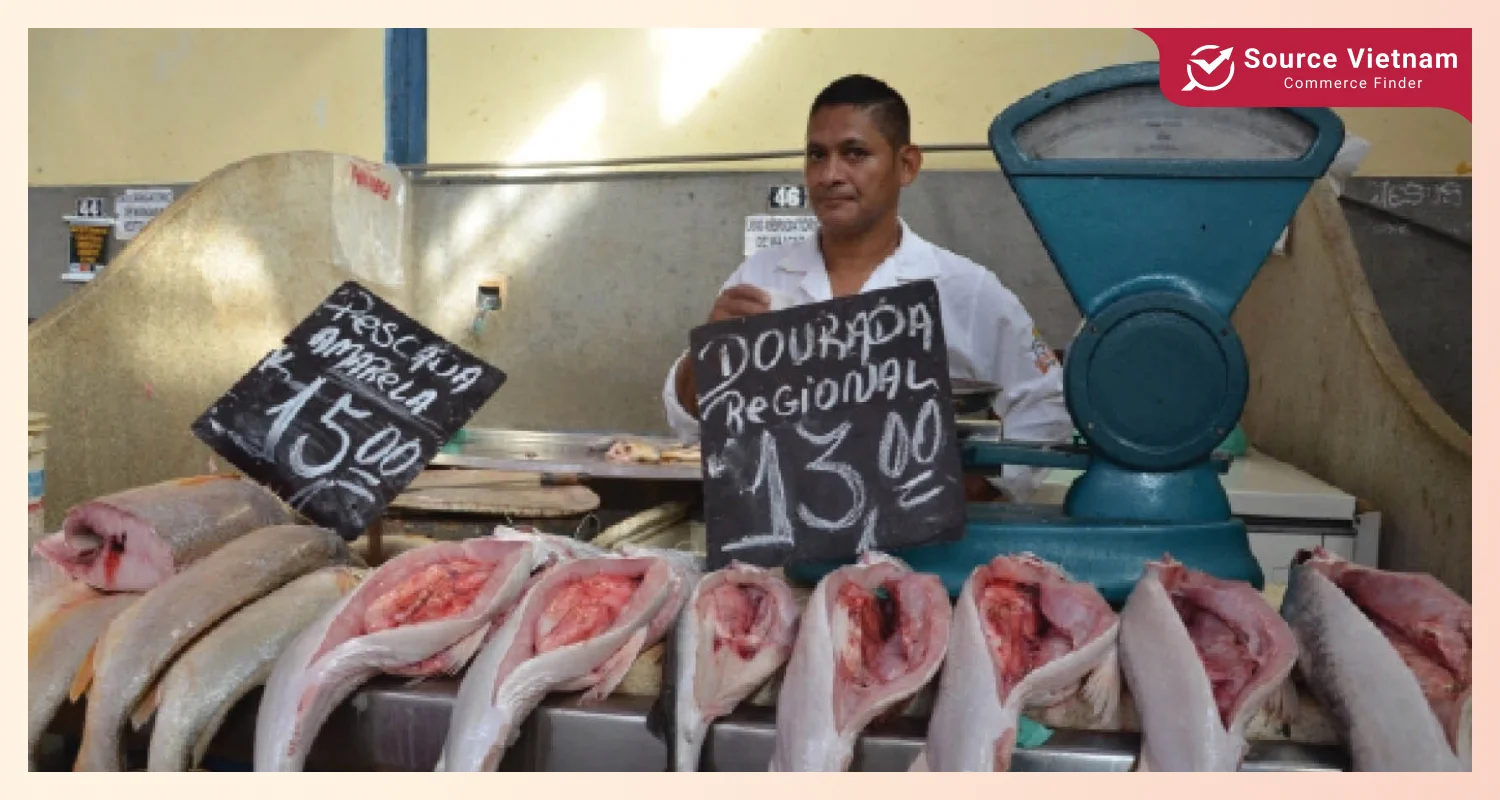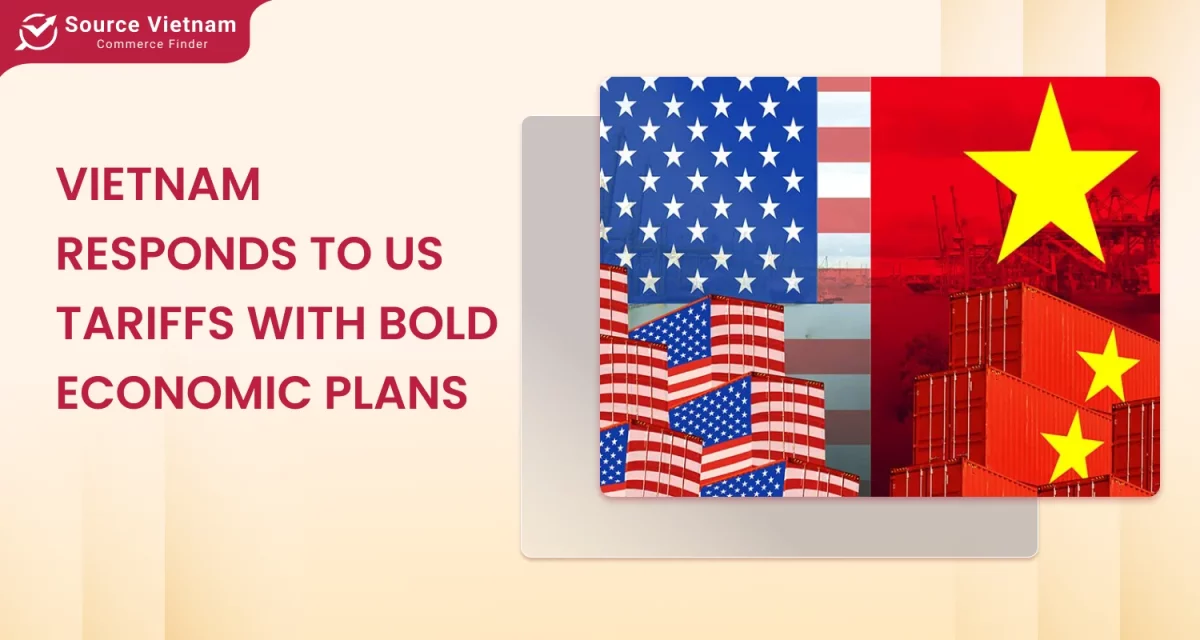Insights:
- In 2024, Vietnam exported 50,500 tonnes of seafood worth $136.6 million to Brazil, becoming its second-largest supplier.
- In early 2025, Vietnam’s seafood exports reached $1.42 billion, up 19% year-on-year.

Vietnam has become Brazil’s second-largest seafood supplier, marking a significant milestone in the global seafood trade. In 2024, Vietnam exported 50,500 tonnes of seafood to Brazil, valued at approximately $136.6 million. This accounted for 17.33% of Brazil’s total seafood import volume and 8.69% of its import value.
Brazil’s growing seafood market
In 2024, Brazil imported 291,600 tonnes of seafood. The total value of these imports reached approximately $1.57 billion. This was not just a normal year—it marked a strong increase in both quantity and value.

Compared to 2023, Brazil’s seafood import volume rose by 8.1%, while the value grew by 10.4%. These numbers show that seafood is becoming more important in Brazilian households.
Why this increase? Experts believe it’s because of shifting consumer preferences. More people in Brazil are focusing on eating healthy. Seafood is often seen as a good source of lean protein and essential nutrients, which matches the rising demand for nutritious and balanced diets.
This trend also reflects the influence of global eating habits. With more people looking for omega-3 rich foods, seafood has become a top choice. It’s not just about taste—it’s also about health awareness.
To meet this rising demand, Brazil has looked beyond its borders and diversified its import sources. In 2024, Brazil increased seafood imports from several countries, including:
- Chile
- China
- Argentina
- Ecuador
- The United States
These countries supplied different types of seafood, ranging from fresh fish to frozen products and value-added items.
But among all these countries, Vietnam stood out the most.
Vietnam’s seafood exports to Brazil saw a massive surge:
- Volume increased by 53.8%
- Value grew by 38.6%
Vietnam exported 50,500 tonnes of seafood to Brazil in 2024, with a total value of $136.6 million.
This performance helped Vietnam become the second-largest seafood supplier to Brazil, contributing 17.33% of Brazil’s total seafood import volume and 8.69% of the total value.
These figures are a clear sign of Vietnam’s growing importance in Brazil’s seafood market.
Vietnam’s seafood export performance
Vietnam’s seafood industry continues to show resilience, adaptability, and strong growth. Despite challenges in the global market, Vietnam has managed to boost its seafood exports in early 2025.

In February 2025, Vietnam recorded seafood exports worth $655.02 million. This was a significant jump of 44.5% compared to January 2025.
Looking at the bigger picture, the first two months of 2025 have already shown solid performance:
- Total seafood exports from Vietnam reached $1.42 billion
- This was a 19% increase compared to the same period in 2024
This growth is encouraging and highlights how Vietnam’s seafood sector is recovering and expanding, especially after years affected by pandemic-related trade slowdowns and logistical challenges.
The top buyers of Vietnamese seafood are still the familiar big markets:
- China
- Japan
- The United States
Together, these three markets account for 52.33% of Vietnam’s total seafood export value.
Here’s what’s happening in these key markets:
- In China, demand for Vietnamese pangasius and shrimp remains strong, especially through cross-border e-commerce and cold chain imports.
- Japan continues to prefer high-quality processed seafood and ready-to-eat products from Vietnam.
- The United States imports a wide variety of Vietnamese seafood, including shrimp, tuna, and squid, which are used in both retail and food service.
Vietnam has also seen rising interest from other emerging markets. These include Brazil, South Korea, Australia, Thailand, the UK, Canada, Germany, and Russia.
This diverse export network helps Vietnam reduce its dependence on a few markets, which adds stability and long-term growth potential to its seafood industry.
As demand continues to rise in both traditional and new markets, Vietnam’s seafood industry is likely to keep growing in the months ahead.
Key export products
Shrimp remains a standout product for Vietnam. In the first two months of 2025, shrimp exports reached $542.387 million, a 30.8% increase compared to the same period in 2024. In February 2025 alone, shrimp exports were valued at $231.406 million, up 33.9% year-on-year.

Pangasius exports totaled $253.241 million during the same period, experiencing a slight 0.8% decline. However, exports to Brazil showed significant growth. In February 2025, pangasius exports to Brazil reached $15 million, up 159% from the previous year. The cumulative total for January and February stood at $28 million, reflecting a 42% increase year-on-year.
Tuna exports amounted to $126.481 million in the first two months of 2025, down 3.5%. However, February 2025 saw an increase of 15.9%, reaching $59.986 million.
Outlook for Vietnamese seafood exports
The outlook for Vietnamese seafood exports remains positive. Increasing demand in major markets such as Brazil, South Korea, Australia, Thailand, the United Kingdom, Canada, Germany, and Russia indicates that Vietnam’s seafood industry is well-positioned for further expansion. The ongoing trend of rising consumption in these markets suggests potential for continued growth.
Vietnam’s seafood sector aims to reach an export turnover of $11 billion in 2025, building on the $10 billion achieved in 2024. Efforts to enhance product quality, expand export markets, and promote reputable producers are central to achieving this goal.
In summary, Vietnam’s emergence as Brazil’s second-largest seafood supplier underscores its expanding role in the global seafood market. With a diverse range of products and growing demand in key markets, Vietnam’s seafood industry is poised for continued growth in the coming years.















